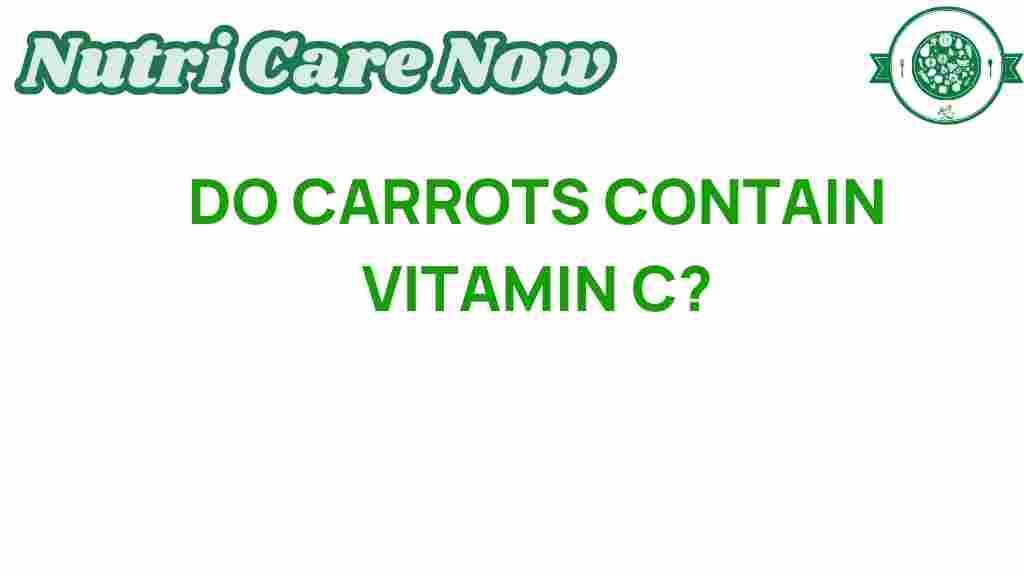Unveiling the Truth: Do Carrots Really Pack Vitamin C?
Carrots are often celebrated for their vibrant color and crunchy texture, but many people wonder about their nutritional value, particularly regarding vitamin C. As a fundamental nutrient, vitamin C plays a crucial role in our overall health, supporting the immune system, promoting skin health, and acting as a powerful antioxidant. In this article, we’ll explore the relationship between carrots and vitamin C, examine their health benefits, and discuss other dietary sources of this essential vitamin.
The Nutritional Profile of Carrots
Carrots are not just a source of beta-carotene, which is famously converted to vitamin A in the body; they also contain a range of other nutrients. Here’s a brief overview of the nutritional content of a medium-sized carrot (about 61 grams):
- Calories: 25
- Carbohydrates: 6 grams
- Fiber: 1.5 grams
- Protein: 0.6 grams
- Fat: 0.1 grams
- Vitamin A: 184% of the Daily Value (DV)
- Vitamin K: 13% of the DV
- Potassium: 6% of the DV
- Vitamin C: 7% of the DV
As you can see, while carrots do contain vitamin C, they are not the richest source. However, they still contribute positively to your daily intake, especially when consumed as part of a varied diet.
The Role of Vitamin C in Health
Vitamin C is an essential nutrient known for its numerous health benefits:
- Immune Support: Vitamin C is vital for the immune system, helping to ward off illnesses and infections.
- Antioxidant Properties: It acts as an antioxidant, protecting cells from damage caused by free radicals.
- Skin Health: Vitamin C is crucial for collagen production, promoting healthy skin and aiding in wound healing.
- Absorption of Iron: It enhances the absorption of non-heme iron from plant sources, preventing anemia.
Given these benefits, incorporating a variety of vitamin C-rich foods into your diet is essential for maintaining optimal health and wellness.
Exploring Other Dietary Sources of Vitamin C
While carrots do provide some vitamin C, many other fruits and vegetables are much richer sources. Here are some top contenders:
- Oranges: Often synonymous with vitamin C, a medium orange contains about 70 mg.
- Kiwifruit: One medium kiwifruit packs around 71 mg of vitamin C.
- Strawberries: A cup of sliced strawberries provides approximately 89 mg.
- Bell Peppers: A half-cup of chopped red bell pepper offers about 95 mg.
- Broccoli: One cup of cooked broccoli contains about 102 mg.
Incorporating these foods into your meals can enhance your vitamin C intake significantly.
How to Maximize Nutrient Retention in Carrots
To get the most out of carrots, it’s essential to prepare and cook them properly. Here are some tips to maximize their nutritional value:
- Eat Them Raw: Carrots can be eaten raw, which preserves their vitamins, including vitamin C.
- Steam Instead of Boil: If you prefer cooked carrots, steaming them is better than boiling, as it helps retain more nutrients.
- Avoid Overcooking: Overcooking can lead to nutrient loss, so aim for a tender-crisp texture.
- Pair with Healthy Fats: Combining carrots with healthy fats (like olive oil) can enhance the absorption of fat-soluble vitamins.
Common Misconceptions About Carrots and Vitamin C
Many misconceptions exist regarding the nutritional value of carrots. Let’s clear up some of the most common myths:
Myth 1: Carrots Are the Best Source of Vitamin C
While carrots do contain vitamin C, they are not the best source. As discussed, many fruits and vegetables provide a much higher concentration of this essential nutrient.
Myth 2: Cooking Carrots Destroys All Their Nutrients
Cooking can reduce some vitamins, but it can also enhance the availability of others, such as beta-carotene. Moderation and proper cooking methods are key.
Myth 3: You Can Get Enough Vitamin C from Just Carrots
Relying solely on carrots for vitamin C is not advisable. A diverse diet including various fruits and vegetables is crucial for meeting your nutritional needs.
Troubleshooting: Low Vitamin C Levels
If you suspect that you are not getting enough vitamin C, consider the following troubleshooting tips:
- Assess Your Diet: Review your daily intake of fruits and vegetables. Are you including enough variety?
- Consider Supplementation: If necessary, consult with a healthcare professional about taking vitamin C supplements.
- Monitor Symptoms: Watch for signs of vitamin C deficiency, such as fatigue, frequent infections, or slow wound healing.
Boosting Your Vitamin C Intake
To increase your vitamin C levels, incorporate more of the following foods into your diet:
- Citrus fruits like oranges and grapefruits
- Berries such as strawberries and blueberries
- Leafy greens like spinach and kale
- Cruciferous vegetables like broccoli and Brussels sprouts
Making small changes to your diet can significantly impact your overall health and immune support.
Conclusion
In summary, while carrots do contain some vitamin C, they are not the richest source. However, they offer numerous other health benefits, including being a great source of fiber and antioxidants. To ensure you are meeting your vitamin C needs, it’s essential to consume a variety of fruits and vegetables. By including carrots along with other vitamin C-rich foods in your diet, you can enjoy the health benefits they offer while supporting your overall wellness.
For more information on healthy eating and nutrition, check out this comprehensive guide on dietary sources of vitamins. And remember, always consult with a healthcare provider for personalized dietary advice.
This article is in the category Health and created by NutriCareNow Team
